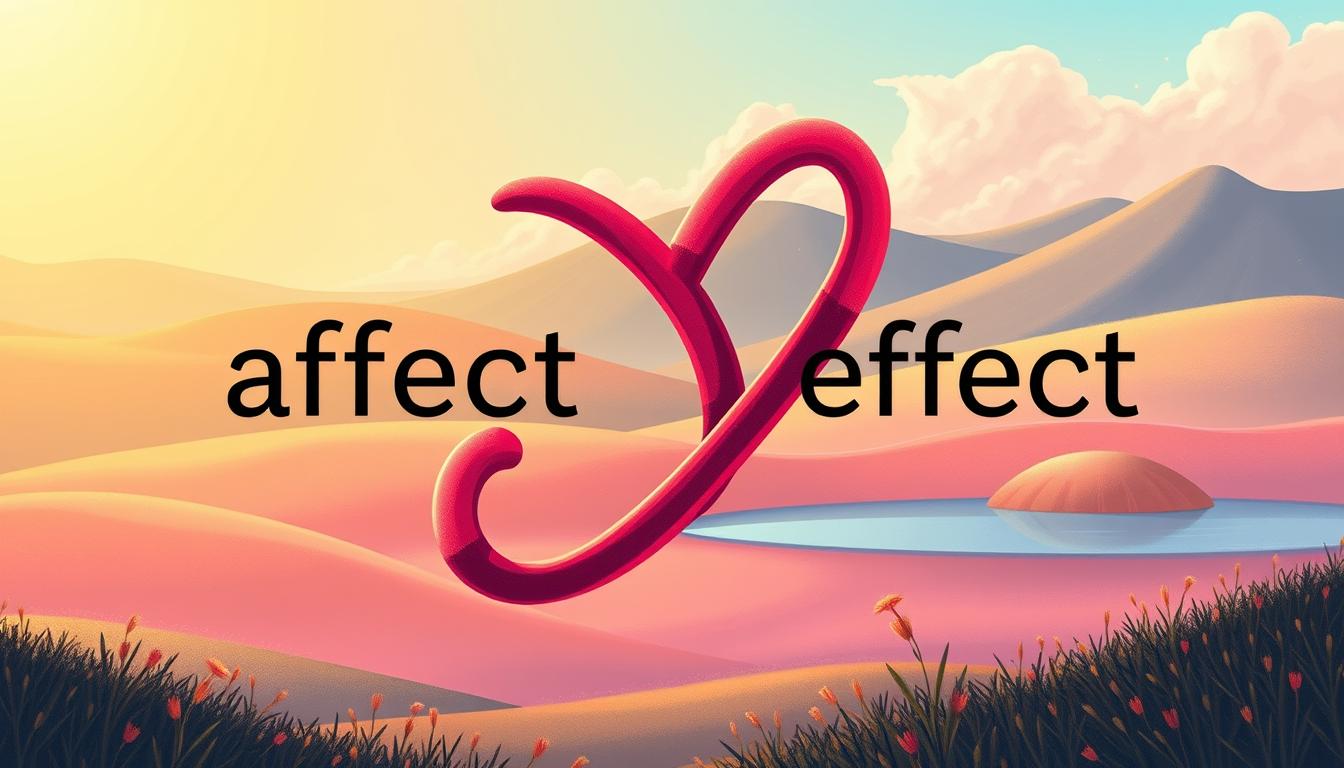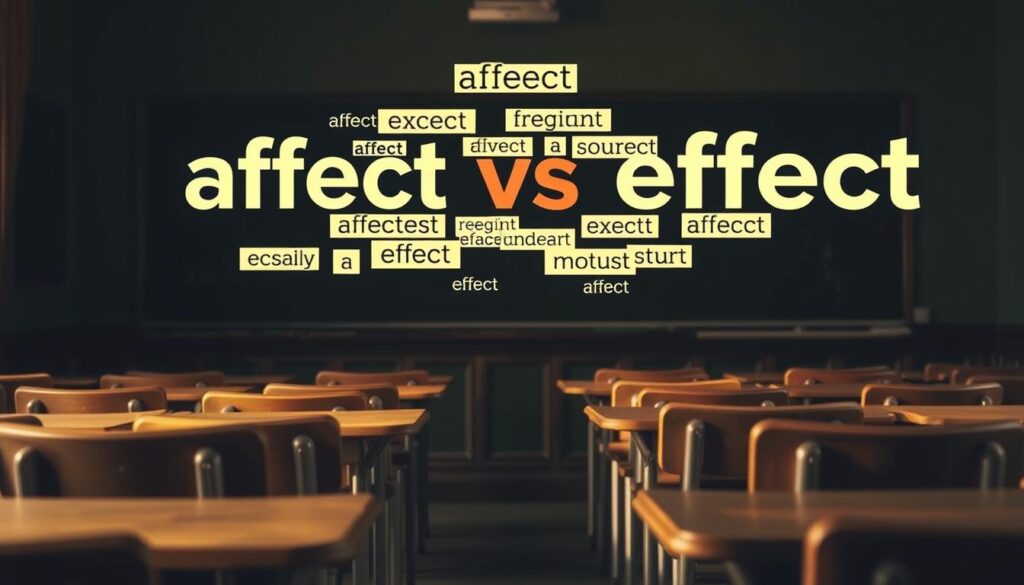Physical Address
304 North Cardinal St.
Dorchester Center, MA 02124
Physical Address
304 North Cardinal St.
Dorchester Center, MA 02124

Understanding English can be tricky, especially with words that sound alike. “Affect” and “effect” are often mixed up. But they have different meanings, and using them right is key for clear talk.
Learning the difference between these words can make your writing and talking better. It’s not just about following grammar rules. It’s about sharing your thoughts clearly and with confidence.
In this guide, we’ll dive into the difference between “affect” and “effect”. You’ll learn how to use them right in different situations. This guide aims to help you improve your language skills in a friendly way.
The English language often confuses “affect” and “effect.” Even skilled writers get these words mixed up. This is because they look and sound similar, making it hard to tell them apart.
Native English speakers find “affect” and “effect” tricky. They sound the same when spoken, which makes it confusing. Also, their meanings are close but different. “Affect” is usually a verb, and “effect” is a noun.
Getting “affect” and “effect” right is key in many situations. It’s important in school papers, business talks, and everyday chats. As George Orwell once said, “If language is to be used at all, it must be used in a way that preserves its meaning.” Using them correctly helps us communicate clearly.
In school, using “affect” and “effect” right can change how people understand research. In business, clear messages can greatly affect how clients or stakeholders see your work.
To get better at English grammar, knowing the difference between “affect” and “effect” is key. This knowledge helps you communicate clearly, whether you’re writing or talking.
“Affect” is mainly a verb. It means to influence or have an effect on something or someone. For example, “The cold weather will affect the crops.” Here, “affect” shows the action of the weather on the crops.
“Effect,” however, is mostly a noun. It means the result or outcome of something. For instance, “The effect of the cold weather on the crops was devastating.” In this case, “effect” talks about the outcome of the weather.
Here’s a quick way to tell “affect” and “effect” apart:
For example, “The rain will affect the parade” (the rain influences the parade). And “The effect of the rain on the parade was significant” (we’re discussing the outcome of the rain).
By understanding and using this basic difference, you can get better at grammar. This will make your communication clearer.
Knowing how to use “affect” right is key for clear writing. “Affect” is mainly a verb. It means to influence or have an effect on something or someone.
The main idea of “affect” is its role as a verb. It shows an action happening to an object. For example, “The cold weather will affect the crops.” Here, “affect” shows how the cold weather impacts the crops.
Key aspect: “Affect” starts with “A,” which helps remember it’s a verb.
“Affect” is used in many everyday situations:
These examples show how “affect” is used to describe influence or impact.
Many people mix up “affect” with “effect.” Remember, “affect” is for actions or influences. For example, “The disease affects millions” is right because it talks about the disease’s action on people.
To get better at writing, practice using “affect” in different ways. Make sure you’re using it as a verb to show influence or action.
To grasp ‘effect,’ we need to look at its definition, main use, and how it varies in different situations. ‘Effect’ is mostly a noun, showing the outcome of something happening or a set of events.
The main meaning of ‘effect’ is the result of something. For example, “The effect of the cold weather on the crops was devastating.” Here, ‘effect’ shows the outcome of the cold weather.
‘Effect’ is used in many areas, like law, medicine, or daily talk. For example, “The new law will take effect next month,” or “The medication had a big effect on her health.” These show how ‘effect’ is used in different ways to mean a result or outcome.
There are common phrases with ‘effect,’ like “in effect,” “take effect,” and “to that effect.” For instance, “The policy is now in effect,” meaning it’s being enforced now. Another example is, “The change will take effect immediately,” showing when the change will start.
Understanding ‘effect’ in different contexts and phrases helps improve English skills. This clarity is key for clear writing and speaking.
The rules for “affect” and “effect” are usually clear. But, there are exceptions that can confuse people. Knowing these exceptions is key to mastering English grammar.

In psychology, “affect” is a noun for an emotional state. For example, “The patient’s affect was flat, showing depression.” This is different from its verb form, which means to influence. For more info, check out our guide on affect and effect.
“Effect” can also be a verb, meaning to cause something to happen. For example, “The new policy will effect a big change in the company.” This is less common but still important to know.
To deal with these exceptions, you need to understand the context. If unsure, try swapping “affect” with “influence” or “effect” with “result.” This trick can help you see which one fits better.
By knowing these exceptions and practicing, you can get better at English grammar. This will help you avoid the confusion that often comes with “affect” and “effect.”
Knowing when to use ‘affect’ and ‘effect’ is crucial in many areas. It makes your writing clear and effective. This is true whether you’re writing a paper, a business report, or just talking to someone.
In academic writing, being precise is important. For example, talking about climate change, you might say, “The rising temperatures will affect the global food supply.” Here, ‘affect’ means to influence. On the other hand, when discussing a study’s outcome, you could say, “The new policy had a significant effect on student outcomes.” Here, ‘effect’ is a noun showing a result.
In business, clear communication is key. For instance, in a report, you might say, “The economic downturn will affect our quarterly earnings.” This shows influence. When discussing a marketing strategy’s outcome, you could say, “The campaign had a positive effect on brand recognition.” This highlights the result of the action.
In daily talks, using ‘affect’ and ‘effect’ correctly makes your speech clearer. For example, you might say, “The rain will affect the parade,” or “The cold weather had an effect on the crops.” This helps get your point across better.
In media and journalism, using ‘affect’ and ‘effect’ correctly is key for credibility. Journalists often report on events or policies using these words. For instance, a news article might say, “The new legislation will affect the housing market,” or “The policy change had a profound effect on the community.” Using them correctly makes the reporting more professional.
By mastering the use of ‘affect’ and ‘effect’ in various fields, you can improve your communication. This ensures your messages are clear and effective.
Mnemonics are a smart way to remember the difference between ‘affect’ and ‘effect.’ They make learning easier, helping you use these words right in different situations.
The RAVEN method is a well-known mnemonic. It stands for “Remember: Affect = Verb, Effect = Noun.” It’s easy to remember that ‘affect’ is a verb and ‘effect’ is a noun. For example, “The rain will affect the parade” shows ‘affect’ as a verb. And “The effect of the rain was seen in the flooded streets” shows ‘effect’ as a noun.
Remembering that ‘A’ comes before ‘E’ alphabetically is another trick. This helps you remember that ‘affect’ comes before ‘effect.’ You can make a sentence like “Affect comes first, then Effect” to help you remember. This trick is great for quick thinking.
Visual association is a strong memory tool. For example, picture ‘affect’ as an action or influence (like someone affecting someone else). Picture ‘effect’ as a result or outcome (like the result of an action).
As
“The key to a good memory is repetition, and the key to using ‘affect’ and ‘effect’ correctly is practice.”
, practicing with mnemonics can really help you understand these tricky words better.
Many digital tools and resources help with using ‘affect’ and ‘effect’ right. They spot mistakes and explain how to get it right.
Grammarly and Ginger are great for finding ‘affect’ and ‘effect’ mistakes. They give tips and reasons why they’re wrong.
Purdue Online Writing Lab and Grammar Girl have detailed guides. They’re perfect for anyone who wants to learn or improve.
Grammarly and Duolingo have fun grammar exercises. They include tests on tricky words like ‘affect’ and ‘effect’.
Using these digital tools can really help you understand and use ‘affect’ and ‘effect’ better.
To make sure you get ‘affect’ and ‘effect’ right, try these exercises. They’re designed to test your understanding.
Fill in the blanks with either ‘affect’ or ‘effect’. This will help you practice using them correctly.
Find and fix the wrong use of ‘affect’ and ‘effect’ in these sentences.
Look at these real-world examples. They show how ‘affect’ and ‘effect’ are used in different situations.
Take a quick quiz to test your skills. Choose the right word (‘affect’ or ‘effect’) for each sentence.
By doing these exercises, you’ll get better at using ‘affect’ and ‘effect’ in different ways.
Learning the difference between “affect” and “effect” is key for clear writing. We’ve covered the basics, exceptions, and examples to help you get it right. This guide aims to make you understand when to use each word.
With practice and exercises, you’ll grow more confident in your writing. Remember, the main thing is to know their meanings and when to use them.
Keep practicing these tips, and using “affect” and “effect” correctly will become easy. Stay dedicated to improving, and you’ll see big changes in your writing and talking skills.